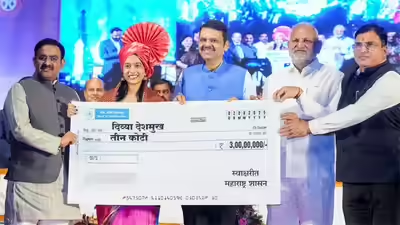On July 28, 2025, Indian chess witnessed a moment that might be remembered for generations. At just 19 years old, Divya Deshmukh clinched the FIDE Women’s Chess World Cup title in Batumi, Georgia, defeating the seasoned Indian Grandmaster Koneru Humpy in a tense tie-break finale.
This victory not only crowned her as the youngest-ever champion of this prestigious event but also earned her the coveted Grandmaster (GM) title making her the fourth Indian woman and 88th Indian overall to join chess’s most elite rank.
But beyond trophies and titles, Divya’s victory reflects a larger narrative: a golden era of Indian chess, the evolving landscape of sports funding in India, and a question that demands urgent attention how can India better nurture and support talent beyond cricket?
From Young Prodigy to World Champion
Divya’s journey to the top wasn’t sudden; it was the result of over a decade of disciplined progression through junior ranks. Beginning as the world’s youngest Woman FIDE Master in 2013, she went on to win World Youth titles in U-10 and U-12 categories, claimed gold with the Indian team in the 2020 FIDE Online Olympiad, and won the National Women’s Chess Championship in 2022. Her achievements include the Asian Continental Women’s title, first place at the Tata Steel Chess India Women’s Rapid, and a historic double gold at the 45th Chess Olympiad in 2024, scoring an impressive 9.5/11 on Board 3.
In 2025 alone, before her World Cup triumph, Divya secured medals at the World Rapid and Blitz Team Championships in London—including her first-ever win against women’s world number one Hou Yifan in blitz. This steady climb shows a clear pathway: consistent performance, supported by coaching, exposure to international tournaments, and mental resilience.
A Symbolic Victory Over a Legend
The World Cup final itself had a deeper symbolism. By defeating Koneru Humpy, a pioneer of Indian women’s chess and former world number two, Divya’s win was more than a passing of the trophy it was a passing of the torch. It signaled the rise of a confident new generation ready to challenge and eventually surpass the previous icons of the sport.
For India, a country where cricket dominates the conversation, Divya’s triumph is a reminder that with structured support and investment, sports like chess can deliver historic results on the world stage.
Maharashtra’s Landmark Recognition
In a gesture that highlighted the growing awareness of non-cricket achievements, the Maharashtra government, led by Chief Minister Devendra Fadnavis, presented Divya with a ₹3 crore cash award during a felicitation ceremony in Nagpur on August 2, 2025. Fadnavis, himself from Nagpur like Divya, framed the award as part of a broader policy to ensure that “no talented sportsperson is deprived of chances due to lack of funds or facilities.”

This wasn’t a one-off statement. The state had previously approved ₹2 crore for a Chess Grand Prix in 2023 and now, through its new sports minister Manikrao Kokate, announced special funds for the advanced training of girl athletes.
Such targeted support matters deeply, especially in sports where player families often bear the cost of travel, coaching, and international exposure. By directly transferring funds into Divya’s account, Maharashtra set an example of efficiency and transparency—a model other states could emulate.
National Landscape: Progress and Concerns
At the national level, the All India Chess Federation (AICF) has introduced initiatives like the Top National Players Stipend Scheme (TNPSS). This scheme, which has distributed over ₹42 lakh so far, provides quarterly stipends to the country’s top young chess players, ensuring that promising talents can focus on improvement without worrying about financial constraints.
However, broader national policies have sparked debate. Recent revisions to the national cash award scheme have withdrawn awards for junior and sub-junior categories (Under-16 and Under-20). For many young athletes, these awards served as vital motivation and financial relief. Additionally, the removal of incentives for Commonwealth Championships outside the main Commonwealth Games has disproportionately hurt sports like chess that use these tournaments to nurture young players.

Critics argue that while the stated goal of the revision is to “simplify disbursement,” it risks reducing overall allocation for athletes. The fear is that the policy undermines grassroots development, contradicting the vision outlined in India’s Draft National Sports Policy 2024, which emphasized nurturing youth talent.
A Golden Era for Indian Chess
Divya’s triumph isn’t an isolated success. It comes amid what many see as a golden era of Indian chess, marked by an extraordinary wave of young talent:
- Gukesh D became the World Chess Champion at 18 in 2024.
- Rameshbabu Praggnanandhaa won the prestigious Tata Steel Masters in early 2025.
- Arjun Erigaisi played a crucial role in India’s Open team gold at the Olympiad.
- R. Vaishali, another trailblazer, achieved her GM title and helped India’s women’s team to Olympiad gold.
- Pranav Venkatesh claimed the World Junior Chess Champion title in March 2025.
Five-time World Champion Viswanathan Anand called this rise a “great celebration of Indian chess.” Together, this cohort shows that India isn’t merely producing stars in isolation; it has built an ecosystem capable of nurturing generations of champions.
The rise of Indian chess provides a blueprint for other non-cricket sports: invest in youth development, create structured pathways, offer financial stability, and reward excellence consistently. The combination of targeted federation support (like the AICF’s stipends) and proactive state-level recognition (as seen in Maharashtra) has created an environment where young athletes can dream bigger.
But the national policy must match this momentum. The removal of incentives for juniors and smaller championships risks breaking the pipeline that produces elite athletes like Divya.
Beyond Financial Incentives
True support goes beyond cash awards. It requires investment in coaching, sports science, mental wellness, and education. As India aspires to become a global sporting powerhouse, these elements must be central to its strategy. Success stories like Divya’s should also be used to inspire wider participation. Role models have power they spark interest among children, reassure hesitant families, and shift public attention toward sports beyond cricket.
Divya Deshmukh’s World Cup triumph has shown what is possible when talent, hard work, and targeted support converge. But for India to consistently produce champions across sports, a cohesive national strategy is needed one that aligns proactive state policies, forward-thinking federation programs, and national awards that value junior athletes as the champions of tomorrow. If India truly believes in “sports for all,” then the lesson from Divya’s journey is clear: recognizing and investing in young talent isn’t an option it’s the only way forward.
How useful was this post?
Click on a star to rate it!
Average rating 0 / 5. Vote count: 0
No votes so far! Be the first to rate this post.






